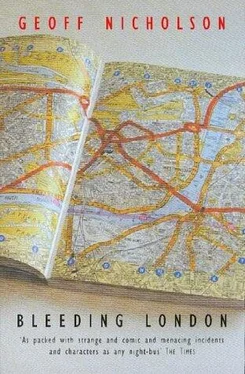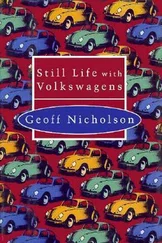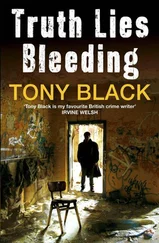When the noise had climaxed, when silence returned, Jack got out of bed and left the bedroom. He didn’t say where he was going and when he hadn’t returned fifteen minutes later Judy wondered whether that was it, whether the show was over and she was expected to slip away without further interaction. That suited her just fine, but she thought he might have told her what was correct form.
She sat uncomfortably on the edge of the bed and heard a door open and close, then a couple of pairs of feet descending the stairs, then voices coming from below, two male, one female. She got up from the bed, dressed, looked briefly at herself in the mirror. Her face was flushed but she looked only slightly dishevelled. She put on her shoes, combed her hair and went downstairs. The voices were coming from the kitchen and they sounded as though they were involved in some sort of negotiation. Judy wanted to leave as quietly and as unobtrusively as possible but Jack spotted her and called after her, “Hey, where do you think you’re going?”
His voice contained a mixture of irritation and command that she immediately resented.
“Home,” she replied defiantly, but she stopped and couldn’t resist peering into the kitchen to get a look at the owners of the two unfamiliar voices. She saw Jack and two strangers arranged in a bizarre erotic tableau. Jack and the woman, who was presumably his wife, were almost naked. Jack wore only boxer shorts, the woman wore nothing but a short T — shirt that revealed a triangle of hirsute shadow beneath its hem. The other man was dark-complexioned, big-chinned, glum-looking. He was more or less dressed, however. He had on a cheap synthetic fibre suit, but wore shoes without socks and he was bare-chested under the jacket.
“This is the young lady in question,” Jack said to the man, and to Judy he said, “and this is Tarek. He’s from Syria. He’s a…”
“Student,” the wife added, trying to be helpful.
Tarek looked briefly, dismissively at Judy, shook his head in sorrow and disgust. Then he hit Jack on the nose. It was very crisp and clean, a trained boxer’s punch, delivered with great control and the minimum of force. Jack yelped and held his nose as blood started to seep from his nostrils.
“What was that for?” Jack demanded.
“You are sick. Very sick,” Tarek said thickly, and he walked out of the kitchen, out of the house and into the Hampstead night. If he had ever been the owner of socks and shirt he was prepared to abandon them.
Jack watched him go. He appeared disappointed but philosophical. He turned to his wife and some coded, silent exchange of information took place. Then he turned his attention to Judy.
“Our friend Tarek got angry because I suggested a little group interaction,” he said. “But just because he doesn’t know how to enjoy himself, that needn’t spoil things for the rest of us.”
Judy was aware that the wife was smiling at her. It wasn’t wholly sexual but she felt its pressure, the amalgam of coercion and flattery.
“I don’t think so,” Judy said. “I’ve got one cross for Hamp-stead. That’s enough for anybody.”
Months later, Jack and Irena would still be recalling this strange, awkward night and wondering what the hell Judy had meant by that cryptic remark.
THE WALKER’S DIARY THE VAST AND THE DETAILED
One of those surprising, bright, sunny March days that make you think the winter’s over even though you know it really isn’t.
On the Victoria Embankment at Charing Cross Pier. A long row of parked, empty tour buses, hundreds of joggers of all sorts and ages, some looking very professional, some looking as though they were on their last legs, and at one point a man performing the weird heel and toe gait of a road walker. Then an old man riding his bike along the pavement and a jogger shouting at him, “Get in the road, mate.”
Benches looking out over the Thames, metal griffins for legs. Then benches with sphinxes, then with camels.
Under Blackfriars Bridge, cardboard boxes, folded blankets, plastic bread trays belonging to the homeless, all arranged and stacked with great precision and symmetry, but no sign of their owners.
At Paul’s Walk the benches were full of people eating their lunches, most of them couples. I wondered if they were having work romances.
You can’t walk straight all the way along the north bank of the river. You get forced up Broken Wharf away from the Thames, into Queen Victoria Street and Upper Thames Street.
I walked down Bull Wharf Lane, a dark, narrow alley leading back to the river, but it was a dead end. There was a black road sweeper working there, and he looked at me like I was daft for entering the street at all.
Under Cannon Street Bridge, a low, bleak concrete tunnel, a place where people don’t belong, and yet there were lots of people there, many of them sharp young men in dark blue suits with ties that were loud but not too loud.
In Angel Passage there were empty drums like giant cotton reels that had once had massive cables coiled around them.
On London Bridge, a painted sign, black on white and now looking old and faded. It said, “Less noise. Please consider offices above.” At that point a hovercraft passed under the bridge, its low, thick engine note reverberating under the broad concrete spans.
♦
Outside a house in Barnes, a huge removal van, the number plates and the name on the side Italian. The van was fully loaded but the back was open and inside, amidst all the packed furniture, two removal men had found a couple of chairs to sit on and they were having a cup of coffee, real Italian espresso, made using a proper metal, screw-top coffee maker, and they were drinking out of rather chic white china cups.
♦
I remember when Christina, the daughter of a friend of ours, was about six years old, and we all went to Brighton for the day. We were walking through the narrow streets up by Kemp Town, when suddenly Christina stopped and looked around her very suspiciously and said, “This street’s in London, isn’t it?”
Being a good parent, her father stopped too and asked her to explain exactly what she meant, but that’s all he could get out of her: “This street’s in London.” She was very confused, maybe slightly scared by it, and she didn’t have the vocabulary to be able to explain herself, so we all shrugged it off as one of those silly ideas that kids get, but afterwards I thought about it a lot, and I think I know what she meant.
She somehow thought that towns, or at least streets or neighbourhoods, were manufactured in large chunks, centrally, off-site. She thought they came ready-made and identical and she’d now encountered a block in Brighton that was exactly the same as a block she’d seen in some part of London. I’ve asked her since if she can remember the episode, but it’s gone.
I sometimes think she had a great idea. Let’s imagine you were a town planner; instead of designing and building a whole new city you could say we’ll have a new Hampstead or a new Knightsbridge, or you could order two hundred yards of Oxford Street or a couple of acres of Hyde Park.
Or let’s say you wanted a whole new metropolis; in that case you’d manufacture a brand-new second London, a perfect replica, identical in every physical detail. Then you could set it up in New Zealand or Dubai or Namibia, move in a population, leave it for a year or two, and then go back and see how much the new London had diverged from the old one.
I realize this is ultimately a meaningless idea. London isn’t simply its architecture and hardware. The new London wouldn’t, for example, be a financial centre, wouldn’t be the seat of kings or government. It wouldn’t have any history, wouldn’t contain the same ethnic or social mix as the original. The climate would be different. But I still think it sounds like run. I still think it might be better than starting from scratch every time someone wants to build something new.
Читать дальше












